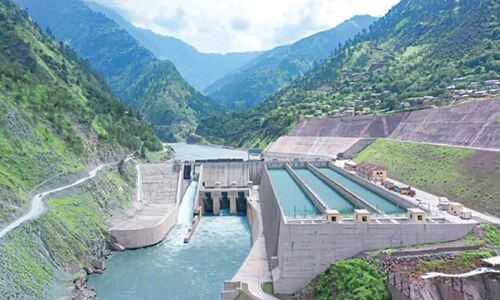 Today when subsidies worldwide shield consumers from record oil prices, the representative government in Islamabad has decided to gradually withdraw it. The government will also continue to levy the sales tax that tends to increase the oil price by about 15 to 20 per cent.
Today when subsidies worldwide shield consumers from record oil prices, the representative government in Islamabad has decided to gradually withdraw it. The government will also continue to levy the sales tax that tends to increase the oil price by about 15 to 20 per cent.
In the budget 2008-09, the allocation for food, fuel, power subsidies has been slashed by 25 per cent from current Rs404.48 billion to Rs295.20 billion during the year ahead. There is no mention of exempting essential items from government levies to provide some relief to consumers.
Given the current rising trend, the price of petroleum products is likely to register a massive increase over the period ahead unless the price bubble bursts on increased oil production and the slump in global demand on US recession.
Apart from withdrawal of subsidy from other essentials, just oil price increase will affect the prices of consumer items in the range of 10 to 20 per cent of the increment. According to an exercise carried out in Karachi essential items became dearer by Rs2 when the price of petroleum was increased by Rs6 recently.
The double digit inflation has more to do with overall economic policies rather than international price hike or a fall in local production. People are being penalised for government’s inefficiency and the country’s economic mismanagement.
The higher-ups in the economic ministries reached in Islamabad over phone called the withdrawal of subsidy a compulsion that cannot be delayed. When asked whether the slashing of subsidies could be interpreted as a callous attitude of an elected government towards electorate already reeling under backbreaking pressure of prices, these officials prayed for more time to set things right.
”It is strange to me as the subsidy was provided when it could have been rationalised and now when the tough economic situation of average Pakistani warrants it, the government has decided to start its withdrawal”, said a senior member of government hierarchy outside the economic ministries.
The officials at the finance ministry spoke of difficult economic conditions the coalition government has inherited and the worsening current account deficit threatening the viability of the economy. With prospects of internal mobilisation of resources not bright in what they termed ‘temporary period of stabilisation’ the government needs support from overseas development partners. The external support, they said, will not be forthcoming unless these donors get the clear signals that the government is serious in improving the vitals of the economy by bringing fiscal and current deficits to acceptable levels.
Ishaque Dar placed the deficit at above nine per cent of the GDP when he became the finance minister. Naveed Qamar, the de facto finance minister, claimed to have brought it drastically down to close the year with budget deficit at 7.5 per cent. The government aims to bring it further down to 4.7 per cent by June next year.
Over the issue of insensitivity of the government towards the plight of vulnerable segments, the government functionaries boasted of Rs34 billion Benazir support programme designed to protect poorest of the poor from economic vagaries through cash transfers.
”A representative government cannot be oblivious to the needs of the people who put them in power. The Benazir support programme will provide them the support they so desperately need to keep them going during the current painful period”, said a government senior officer who wished not to be identified.
He failed to explain why it should be assumed that this subsidy would reach the targeted families when such earlier programmes have failed. The administrative costs of such schemes have often been higher than the economic gains in a set-up riddled with corruption.
”The power structure especially in rural areas where majority of the targeted beneficiaries of the Benazir support scheme are located is obstructive and most of such transfers ultimately land in pockets of the patronised and not necessarily the eligible. I see no reason to assume that the fate of this scheme to be any different. The Rs34 billion allocated for Benazir programme should have been used for food or oil subsidy where misappropriation of funds at mass scale is comparatively difficult” said a senior economist talking to Dawn over telephone from Washington.
Senior officials in Islamabad tried to defend the government decision as they said a subsidy creates distortions in the working of free market leading to careless wastage of valuable resources by consumers and producers who get it cheap. This again is an argument put forward by the World Bank and IMF in their literature very often.
However, one wonders why champions of free market US, EU and Japan have such high agriculture subsidies. What keeps these nations from letting their agriculture vanish if it is not affordable and when food abundant developing world can feed them at much less a price. They defend their protectionist policies with their own logics, get away with it and continue to dominate the world on the strength of their economic prowess.
A country can be a free market economy and be protectionist towards sectors it deems necessary. It is about development priority as well as economic logic. Despite rhetoric about free market, production and exports are subsidised the world over in varying degrees.
The argument of government bankruptcy to persuade people to endure more economic pain lose weight when fleets of shinny jeeps with party flags fluttering are visible all over and aeroplanes are parked at ministers whims to carry friends back and forth.















































Dear visitor, the comments section is undergoing an overhaul and will return soon.